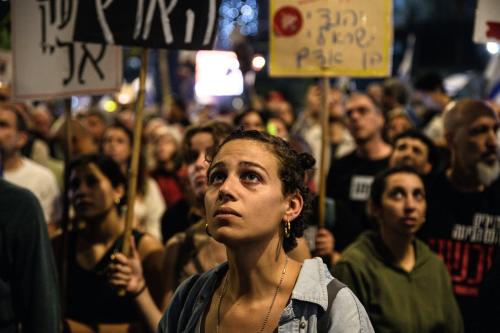The following opinion was originally posted at the America Abroad weblog on TPM Café. All past posts may be found at America Abroad – A Blog on Current Affairs on this website, or at TPM Café.
The biggest problem with the ISG report is that it, like much of Washington, buys into the notion that because the consequences of defeat are so dire we should not accept the reality that we have lost. Even as they paint a devastating picture of the disaster that has befallen Iraq, the commissioners insist that we must continue to try to make things work — bring neighbors in, train Iraqis, urge reconciliation — in the hope that the situation there will turn around and get better. But hope, as Colin Powell was fond of saying, is not a strategy. Worse, it offers Americans and Iraqis the false prospect that with a bit more effort, and a change in policy, defeat in Iraq can be avoided.
The most basic flaw in the report is the belief that political reconciliation is still possible in Iraq. But there is no evidence to support that belief — and there is plenty of evidence that the opposite is true. Iraqis are dying at a rate of well over 100 per day — which adds up to 40-50,000 Iraqi men, women, and children perishing each year. Many times that number are seriously wounded. Those that aren’t killed or maimed are leaving Iraq — currently at a rate of 1 million Iraqis per year. These are numbers that affirm, in ways that no spin can counter, that Iraq is now and has been for quite some time descended into a deadly civil war — a war in which Baghdad, the Iraqi capital city, stands at the bloody center.
The worsening security situation throughout the country is driving people into their own sectarian corners, thus undermining trust and confidence that are essential to any reconciliation process. Iraqis know that their government has failed in its most solemn duty — which is to protect the people. They know the folks huddling in the Green Zone are a government in name only, not a government in fact.
Nothing that the ISG proposes will change this central reality. Without a government — and without the vast majority of people trusting those who govern — people will seek safety and security among their own, while those who can will leave the country altogether. We’ve seen this picture before — in civil wars that engulfed the Balkans, Afghanistan, Rwanda and a host of other countries. Neither better training of a security force whose loyalties lie with sectarian rather than national interests nor more sticks and carrots to urge sectarian leaders to reconcile nor even deft diplomacy involving the neighbors is going to change this essential fact.
The only reality that matters — and one the ISG Report, for all its realism, refuses to accept — is that we have lost in Iraq. We need to face that essential fact squarely — and not offer a false hope that we can somehow, with a tweak here and another there, stave off defeat.
What we need now is a policy that manages the consequences of our defeat — one that focuses on making sure the civil war doesn’t become a regional war. We need to get our troops out of Iraq and, as the ISG rightly urges, we need to focus on restoring our standing in the Middle East. That requires talking to all of the countries in the region — not just our friends, but also our foes. Above all, it requires a serious effort to try to solve the Israel-Palestinian conflict once and for all.
Iraq is lost. Let’s try to avoid having the rest of the Middle East sink with it.
Posted at TPM Café on December 8, 2006 — 10:38 AM Eastern Time




Commentary
Op-edThe Iraq Study Group’s False Hope
December 8, 2006